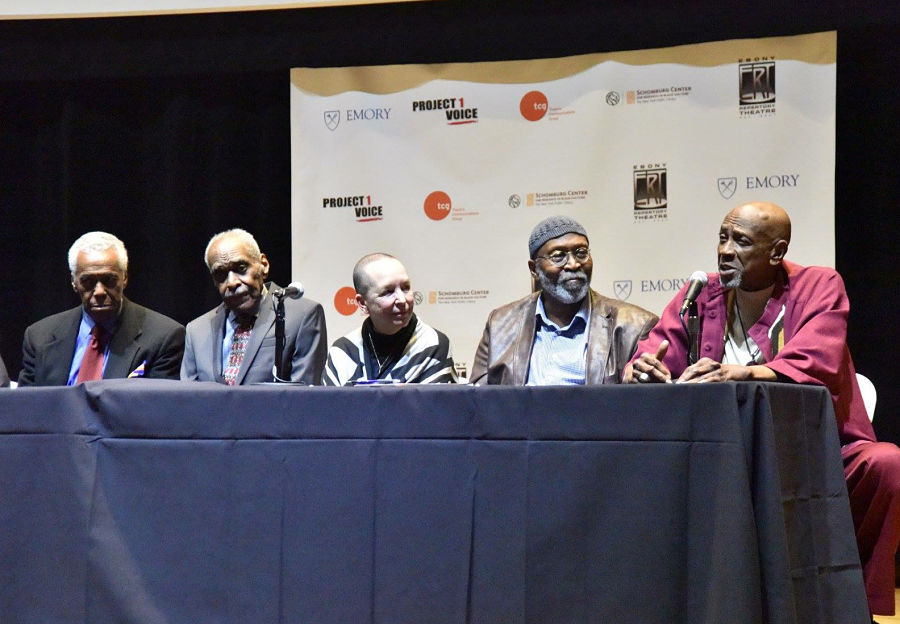Throughout 2017, the subject of criticism, in the broadest sense, has been on my mind. I think about the delicate ways we treat each other in friendships and workspaces, being careful not to offend, when sometimes constructive feedback is exactly what is needed to improve our individual and collective games. I think about the artistic directors who regularly point to a shortage of spaces in which to talk about their own and each other’s work honestly. Plenty of time is spent analyzing the business challenges, but not enough in rooms where there is detailed discourse about the artistry itself.
And then there’s the ever-declining number of critics and writers at mainstream news outlets, all while the “Trump Bump” ensures an ever-growing press presence to cover the minute-to-minute dramas playing out in Washington, D.C. And while we’re on that subject, there’s the commander-in-chief, whose response to criticism is to go on Twitter tirades and bully anyone who challenges his actions or ideas. Who can forget when Hamilton actor Brandon Victor Dixon read a statement from the stage to Vice President-elect Pence that began, “We, sir, we are the diverse America who are alarmed and anxious that your new administration will not protect us…” and @realDonaldTrump’s response was, “Our wonderful future V.P. Mike Pence was harassed last night at the thea-ter by the cast of Hamilton, cameras blazing.This should not happen!” and “The Theater must always be a safe and special place.The cast of Hamilton was very rude last night to a very good man, Mike Pence. Apologize!” And @BrandonVDixon’s reply: “conversation is not harassment sir. And I appreciate @mike_pence for stopping to listen.”
In the ways we talk about theatre and to each other about the work, two experiences in 2017 have stuck with me.
In March I attended the Al Bugaa International Theatre Festival in Sudan, where, in addition to co-teaching workshops in arts management alongside Hattiloo Theatre founder Ekundayo Bandele, I was a juror for the festival itself. The location was an outdoor theatre in Omdurman, a city adjacent to Khartoum. At the theatre’s entrance was a bustling plaza with coffee, food, and animated conversation. The crowd was ready to immerse themselves in performances, all of which they would discuss and debate afterward while socializing and catching up with friends. Meanwhile, the jury of 10, including representatives from Sudan, Egypt, Algeria, and the U.S. (me), gathered after each show to discuss what we’d just seen. Since the proceedings were in Arabic, one of the jurors acted as my interpreter. Whether or not the overall response was good, bad, or somewhere in between, there was a detailed and passionate discussion about each production element: the script, the physical production, the acting, the topic of the play. Several dealt with themes of displacement, and at least one juror opined that North African playmakers needed to get beyond writing so much about this state of affairs, however pressing. In sum, no play was simply dismissed. Each received respectful, in-depth analysis.
In our day-to-day conversations about theatre, there can be a lack of language for, or interest in, discussing the in-depth totality of a performance. How often is the prompt, “What did you think about the show?” met with, “Eh, it was okay” or “It was great, I really loved the acting and the script was brilliant.” Or the dreaded, “It was interesting.” We have so many theatre riches before us, but by not taking the time to fully embrace and relate to all production elements, we effectively take them for granted.
I was also deeply inspired by a panel discussion held at Emory University in Atlanta in October to celebrate the co-founders of the Negro Ensemble Company as part of TCG’s Legacy Leaders of Color Video Project. The panel, organized by Erich McMillan-McCall of Project1VOICE and Elena Chang of TCG, included Douglas Turner Ward, Robert Hooks, Ruben Santiago-Hudson, Pearl Cleage, Carlton Molette, Walter Dallas, and surprise guest Louis Gossett Jr. In addition to discussing the brilliant history of NEC, they talked about how open critique—of themselves and each other—helped them achieve ever growing levels of excellence. They were committed to raising the bar every single day, and Gossett talked about how this was possible because of the honest feedback they gave and received. They soaked up the criticism and worked to improve, a process that was essential to their success. In summing it up, one panelist said: “It is hard work, and you must work at it.”
As we head into a holiday season and a new year, I see renewed purpose in how we approach criticism, both formal and informal, whether as professional writers, artists, collaborators, or enthusiastic theatregoers. I also hope that we can find ways to invest in a next generation of theatre writers, who are working across mediums to bring new awareness and interest to the art form we so love.
Speaking of investing in the art form we love: As we enter a season in which we count our blessings, we at TCG are filled with gratitude for our national and global thea-tre ecosystem, which for nearly 57 years TCG has worked to strengthen, nurture, and promote through leadership development, cultural exchange, convenings, research, book publishing, advocacy in Washington—and, of course, this very magazine. As you will see in J.T. Rogers’s lovely letter, we need your support to continue serving into the future. You might even call it critical. Happy Holidays!


